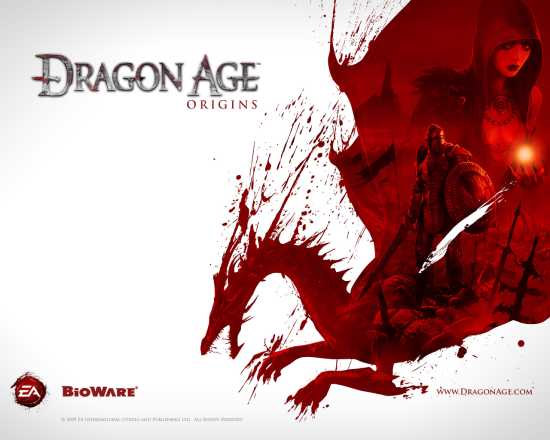
It’s the end of the year, and I’ve been seeing Dragon Age pop up on a few best-games-of-2009 lists, like this one. Yet despite being one of my most anticipated games of the year, it turned out to be a huge disappointment for me. I think you can mostly boil my problems with the game down to one thing: a lack of innovation. To me, it represents the taking of the safe path, making no attempt to forge a trail of its own.
DA comes, of course, from Bioware, unquestionably one of the best and most consistent Western developers. Baldur’s Gate and the sequel are two of the best CRPGs of all time, and most of their recent games have hit the mark too. With Dragon Age, I expected that the long development time would have resulted in something really special. Freed from the restrictions of the D&D system and setting, Bioware could set their imaginations free and really push the bar of what we expect in an RPG.
Hoewver, this didn’t really happen. Rather than pushing boundaries, breaking rules and making new ones, Dragon Age conforms to almost every fantasy and RPG stereotype there is. To start with the plot, the kingdom is made up of men, elves, and dwarves, who don’t really get along. There’s a dark force threatening the world. I mean, seriously? They had a blank canvas and couldn’t come up with anything more original than that? I haven’t finished the game yet, but 30 hours in the story hasn’t become any more interesting, with no significant plot twists or even particularly interesting characters (with the exception of Morrigan and Shale, the sarcastic golem who has some great lines).
The big “innovation” with the story that Bioware were pushing was the fact that you can choose from a number of possible races and starting situations for your character, and these origin stories would colour the story throughout the game. In practice, it seems that this just means there are a few different 60-minute or so game intros, and after that there are simply some extra branches in conversation trees as you make your way through the rest of the story.
The gameworld is as uninteresting as the plot. Levels are small, linear, and static, with no use of physics objects or even background details like fauna, weather or environmental effects. Characters are mostly static, standing on the spot and waiting around for you to talk to them and solve their problems. The world map is constricted arbitrarily, with new areas appearing only when a character in the game tells you to go there. There is zero exploration.
If the game itself was fun, balanced and gave you that awesome “if I play just another 10 minutes I’ll unlock the next reward” feeling, none of this would matter particularly. I loved Oblivion, for instance, but that game’s plot is no better, and it has plenty of faults of its own. However, Dragon Age’s mechanics simply aren’t very interesting. Among other things, it suffers from a lack of information and transparency regarding its basic workings. There simply isn’t any information on basic calculations, information that any D&D player has at his fingertips. The interface doesn’t help either; for example, Dragon Age has a huge “codex”, with hundreds of encyclopedia-style entries filled in as you go along; a fine idea. However each entry is presented as a simple NUMBERED SQUARE in the interface and you need to click it to see the content! Some vital game information is conveyed in the codex and the difficulty of finding anything in there is horrendous and completely unnecessary.
Other companies like Bethesda have shown us a different way of doing things lately, Fallout 3 being my favourite game of 2008 and showing everybody what a sprawling open-world RPG with semi-real-time combat could be. Dragon Age, however, simply slavishly follows existing paradigms and doesn’t even tell a good story along the way. Come on, Bioware, I know you can do better than this!
(My friend Justin already wrote his version of this post over at his blog. We bitched about the game together a few times so it’s not surprising we feel the same way!)